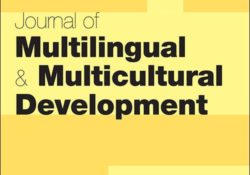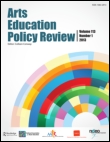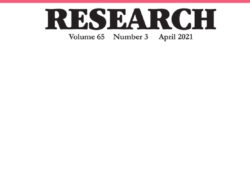tandfonline.com har udgivet en rapport under søgningen “Teacher Education Mathematics”: ABSTRACT ABSTRACT The ability to notice students’ mathematical thinking is key to better understanding student learning and effective teaching. Our professional development program utilized a Child Study Assignment in an attempt to strengthen K–3 teacher noticing. We applied principles of improvement science to improve this assignment to better support the development of teachers’ noticing skills. In this article, we first describe the Child Study Assignment and adjustments made to the assignment across time. Next, we provide suggestions for how this assignment might be adapted in other contexts. Lastly, we present teachers’ perceptions of the usefulness of the Child Study Assignment. Teachers in our professional development program reported that the assignment offered valuable learning experiences, and they often shared their experience… Continue Reading →
Like this:
Like Loading...
eric.ed.gov har udgivet: Child care quality is usually measured along two dimensions–structural and process. In this paper the authors focus on process quality–the quality of child care center instructional practices and teacher interactions with students. They use an instrumental variables technique to estimate the effect of child care center process quality on academic achievement for children. They use a national data set, focusing on low-income children, to examine the effects of high process quality child care on math, reading and vocabulary outcomes for preschool children. The goal is to discover the causal effect of process quality on children’s academic outcomes in the preschool years. The present study is an analysis of secondary data collected at different sites around the country, which is described in detail here. Data from the Preschool… Continue Reading →
Like this:
Like Loading...
tandfonline.com har udgivet en rapport under søgningen “Teacher Education Mathematics”: ABSTRACT ABSTRACT Multilingual families face decisions about the linguistic upbringing of their children. These decisions shape their family language policy (FLP) which potentially impacts the children and their family. Departing from this hypothesis we conducted a systematic literature review applying the PRISMA guidelines, screening three databases, using search terms related to FLP (building on Spolsky’s framework). After a title- and abstract-based initial screening, 191 retained articles were scanned for a connection between FLP (components) and outcomes. We classify forty-two studies that describe such a link in multilingual families with focal children under the age of thirteen. Based on our results, we argue that studies exploring the socio-emotional (9) and cognitive outcomes (13) are underrepresented, especially because all but one of… Continue Reading →
Like this:
Like Loading...
eric.ed.gov har udgivet: This booklet is one in a series on different education topics intended to help parents make the most of their child’s natural curiosity and become an integral part of reaching the National Education Goals as set forth by the President and governors in 1990. The book suggests ways that parents can generate interest in mathematics in children aged 5-13. Three initial sections discuss ideas parents need to consider when working with their children. Concepts discussed include the importance of mathematics, parents’ and students’ attitudes toward mathematics, the meaning of being a mathematics problem solver, communicating mathematics, and how to use the book. Twenty-six activities are presented that incorporate games, problem solving, and hands-on experiences to teach mathematical concepts. The activities are divided into three categories: (1) Math… Continue Reading →
Like this:
Like Loading...
tandfonline.com har udgivet en rapport under søgningen “Teacher Education Mathematics”: Abstract Formulae display:?Mathematical formulae have been encoded as MathML and are displayed in this HTML version using MathJax in order to improve their display. Uncheck the box to turn MathJax off. This feature requires Javascript. Click on a formula to zoom. Abstract It has been asserted that the test-based accountability of No Child Left Behind (NCLB) increased instruction in tested subject areas reading and math, leading to reductions in arts education. We tested this using two waves of data, before and after NCLB implementation, in a difference-in-differences design. The analyses indicated that the total teacher workforce increased substantially during this time period, while the percentage of reading and math educators remained constant, leading to an overall increase in the teacher… Continue Reading →
Like this:
Like Loading...
eric.ed.gov har udgivet: This paper reviews nationwide education reforms under No Child Left Behind and state reforms in Florida–comparing federal and state results. The paper examines the danger that federal regulations and incentives pose to testing and accountability systems in Florida and every other state. The limits of No Child Left Behind and the promise of Florida’s success suggest that federal policies that give states greater authority to direct education reform hold promise for improving education when states and citizens commit to effective reforms. The paper states that as policymakers review No Child Left Behind, Congress and the Obama Administration should recognize three important lessons: (1) No Child Left Behind has failed to deliver meaningful improvement in student learning; (2) Florida’s experience demonstrates the opportunity for state-directed education reform; and… Continue Reading →
Like this:
Like Loading...
eric.ed.gov har udgivet: The field of early childhood holds promising keys to unlocking many of the mysteries in learning. Educators in the field, given the right tools, have the potential to have a profound impact on the long-term success of their students. The design of this curriculum comes directly out of the incredible possibilities set in motion while exploring this field. Early childhood programs have three essential components or learners. Primary learners are the child, the parent(s) and the teacher. In order to best serve the child, early childhood programs must not only focus on the curriculum and programmatic issues, but must also spend time training staff and providing learning opportunities for parents. Successful early childhood programs aim to employ the most effective resources available to meet the needs of… Continue Reading →
Like this:
Like Loading...
tandfonline.com har udgivet en rapport under søgningen “Teacher Education Mathematics”: ABSTRACT ABSTRACT The aim of this study was to explore whether the classroom implementation of the International Child Development Programme (ICDP) for secondary school students (grade 9) was linked to better school achievement. The goal of the ICDP is to increase school achievement by promoting positive teacher-student relationships. The study, performed in Sweden, applied a pre–post design (four years) with matched intervention and control schools (N = 148). The post-intervention assessments showed that there were significant differences in school achievement in Grade 9 between the intervention school and the control school. Specifically, a greater proportion of students at the intervention school demonstrated improvement in school subjects and achieved the competency requirements to enter an upper secondary school programme. Based on the results,… Continue Reading →
Like this:
Like Loading...
eric.ed.gov har udgivet: This research examines the impact of the No Child Left Behind (NCLB) Act on elementary science education within a Midwestern state possessing strong national education measures. Elementary teachers (N = 164) responded to an online survey, which included both closed-ended and open-ended questions pertaining to science instruction and changes made in science instruction since the implementation of NCLB. More than half of these teachers indicated they have cut time from science instruction since NCLB became a law. The reason given for this decrease in science education was mainly the need to increase time for math and reading instruction. (Contains 3 figures.) Link til kilde
Like this:
Like Loading...
eric.ed.gov har udgivet: Mathematics has become increasingly important in this technological age. That is why it is even more important for children to learn mathematics at home as well as in school. This second edition of “Helping Your Children Learn Math” is for parents of children in kindergarten through fifth grade. It has been revised to include a variety of activities that will help children learn and apply mathematical concepts such as geometry, algebra, measurement, statistics, and probability in useful and fun ways. All of the 29 activities in this book relate mathematics to everyday life and complement many school mathematics lessons. Additional resources are also listed at the end. (ASK) Link til kilde
Like this:
Like Loading...



